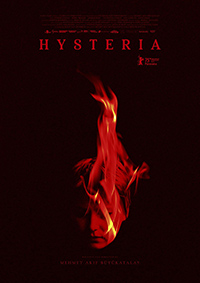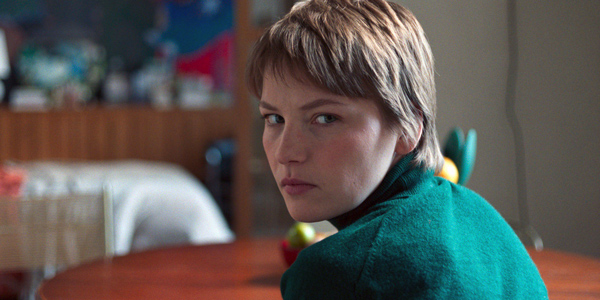Burn After Filming: Büyükatalay Explores Colliding Perspectives in Nuanced Drama
 While it can’t be described as a classic thriller, Mehmet Akif Büyükatalay’s sophomore film Hysteria is pregnant with as much dread and unease as any genre exercise, exploring contentious sentiments amongst a cast and crew during a troubled film shoot. Much like his 2019 debut, Oray, Büyükatalay explores the fractured perspectives of Muslim experiences in contemporary Germany, this time shifting his gaze to the complexities behind the production of images and representation. Deftly exploring the tacit, ingrained power hierarchies within the film community, where Westernized standards favor either assimilationist tendencies or tend to ignorantly approach narratives of disenfranchised experiences, Büyükatalay reflects a symbolic power struggle which eventually reaches an incendiary pitch.
While it can’t be described as a classic thriller, Mehmet Akif Büyükatalay’s sophomore film Hysteria is pregnant with as much dread and unease as any genre exercise, exploring contentious sentiments amongst a cast and crew during a troubled film shoot. Much like his 2019 debut, Oray, Büyükatalay explores the fractured perspectives of Muslim experiences in contemporary Germany, this time shifting his gaze to the complexities behind the production of images and representation. Deftly exploring the tacit, ingrained power hierarchies within the film community, where Westernized standards favor either assimilationist tendencies or tend to ignorantly approach narratives of disenfranchised experiences, Büyükatalay reflects a symbolic power struggle which eventually reaches an incendiary pitch.

Elif (Devrim Lingnau) has landed a dream position as an intern on a new film project by Yigit (Serkhan Kaya), a lauded film director. Reenacting racist arson attacks on German migrant residences in the 1990s, Yigit hires a handful of local Arab extras who are dismayed when they see the Quran burnt on set. When filming wraps for the day, Elif is charged with driving the extras back to the center where they reside while also taking the film reels to Yigit’s residence, where she’s scheduled to stay while he and his producer Lilith (Nicolette Krebitz) are away. While interacting with the extras, and swayed by their dismay over Yigit’s decision to burn an actual copy of the Quran, Elif loses the keys to Yigit’s apartment, and through a series of circumstances, unwisely gives her address to an unknown caller who claims to have found them. She asks Said (Mehdi Maskar), one of the extras with whom she’s become close, to stay with her, and thus begins a complicated cover-up of her own actions when it’s discovered the film reels she brought back with her are suddenly missing.
Devrim Lingnau’s innocent Elif, who reads as something of a sprite in both name and comportment, is the literal and figurative connective tissue between two worlds. Half Turkish and German herself, she is mired by guilt and ambition, on one hand held culpable to the Arab extras whilst also eager to make a good impression on the notable director she’s working for. But there’s nothing distinctly binary about the viewpoints at hand, which range from explosive to dismissive as regards what burning the Quran, and under what circumstances, such an act signifies. Lingnau is essentially the life blood of the film, her performance reflecting a journey of enlightenment as regards speaking truth to power, even if there are substantial consequences to her career path.
Essentially, Hysteria is a film about a complicated moral dilemma which is aggravated by gatekeeping tendencies as to who’s allowed to create (and, therefore, magnify and define) cultural representation through media. The title suggests a tendency for the hyperbolic in what, with some distance, should be an innocuous situation on a film set. But it also suggests there’s something innately significant about cinema and the ersatz immortalizing it promises. Yigit’s defense of the Quran burning reflects the callousness, and perhaps dangerousness, of being uninformed about cultural nuances, especially as pertains to sensitive subject matter. Hiding behind the gallantry of his intentions, he ironically foments re-traumatization with his ignorance, and, as would be expected, doubles down on his intention. What becomes intensely interesting is the changing discourse between similar yet opposing perspectives, as Yigit himself is Turkish-German, but whose experiences and background have resulted in assimilationist tendencies.
Of course, the crux of Hysteria’s dilemma becomes mired in Elif’s obfuscation of lost keys and the suspiciously stolen film. Büyükatalay continues to turn the screws as Elif’s naïveté and gender perspective blind her to the intentions of the extras she’s become quickly attached to, particularly Said. No one, it seems, is truly forthcoming about their motives or thought processes, and the film strangely feels like a drastic coming-of-age parable for a young woman learning to play the game of life, where one must become well-versed in the murky depths of human behavior.
Reviewed on February 15th at the 2025 Berlin International Film Festival (75th edition) – Panorama. 104 mins.
★★★½/☆☆☆☆☆


